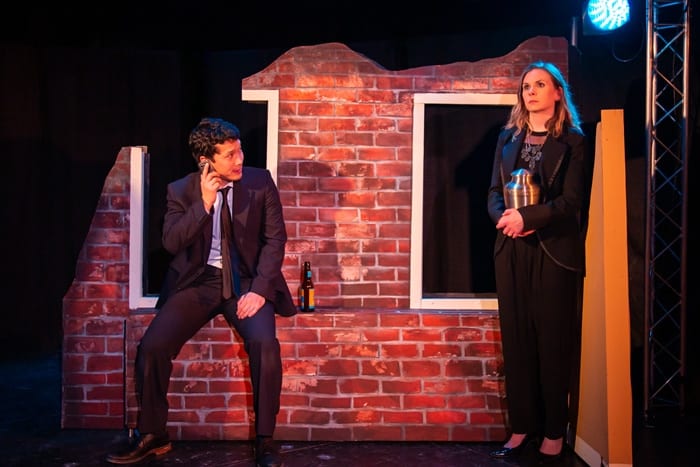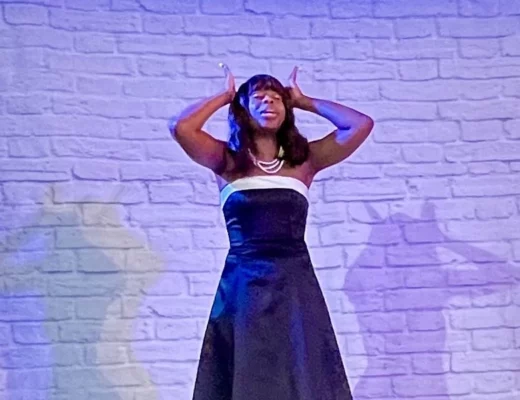by John Bavoso
This article was first published on DC Theatre Scene and can be found on their site here.
Morrie Schwartz, the sociology professor and subject of Mitch Albom’s bestselling book, Tuesdays with Morrie, once said, “Death ends a life, not a relationship. All the love you created is still there. All the memories are still there. You live on—in the hearts of everyone you have touched and nurtured while you were here.”
Leave it to a playwright like Joe Calarco to take a sentiment like this literally and put it up on the stage. The result is 4615 Theatre Company’s world premiere production of Separate Rooms, a haunting and sometimes hilarious look at the tiny ripples and huge waves the death of a loved one can send through the lives of those left behind—and a showcase for a supremely talented cast.
Calarco—a prolific playwright and the Director of New Works at Signature Theatre—refers to Separate Rooms as his Big Chill, which began its life years ago as a short play written while the author was living and working in New York. As Calarco grew up, so did the characters, and so did the page length, eventually becoming the 95-minute work that’s been entrusted to 4615 Theatre Company, a relatively young and new-on-the-scene company based in Silver Spring.
The story—or stories, really—revolve around the sudden and violent death of Him (Alex Mills), a young gay man who lived in New York City with his boyfriend, Josh (Stephen Russell Murray), circa 2011. He’s trapped in a void-like afterlife, where he watches his sister, Anna (Jenn Rabbitt Ring), and Josh’s coterie of friends from his Cornell University days grapple with their sudden loss in various rooms of their apartment following his funeral. In addition to this close-knit group, there are unexpected visitors, including Josh’s lusty downstairs neighbor, Simon (Reginald Richard), and The Guest, a mysterious woman (Melissa Carter) who appears to speak mostly in out-of-context movie quotes.
There are, in fact, nine characters in total, which is a lot for a tiny, one-bedroom Manhattan apartment (or even smaller black box in downtown Silver Spring) but director Jordan Friend—who’s also the Founding Artistic Director of 4615 Theatre Company—applies a deft hand in navigating his actors around the cramped space while giving them each moments to shine.
And shine they do, when given the chance. With so many characters to introduce, Calarco naturally had to prioritize the stories of some over others. As Him, Mills acts as our tour guide even as he comes to terms with the rules of his new reality. Mills brings variations of tenderness, sarcasm, bitterness, and longing to his role of the recently deceased, observing the world go on without him and being frustrated by not being to do anything but watch.
Jen Rabbitt Ring’s Anna is a tangled-up knot of stress and grief, the archetypal overworked non-profit executive who’s both tightly wound and completely unraveling. The character could easily devolve into stereotype in less-capable hands, but Ring brings an authenticity and relatability to the role. Similarly, Stephen Russell Murray embodies Josh’s neurotic copyeditor persona perfectly, while injecting convincing sexual energy to a number of his scenes. In too many plays with gay couples, the characters are given little in the way of reason for being attracted to one another than they happen to be gay and in the same play, but the connection between Him and Josh feels genuine (due credit also goes to intimacy director Jonathan Ezra Rubin).
Many of the characters who are given less in the way of backstory are offered other opportunities to dazzle. The perfect example of this is 4615 company member Alani Kravitz as Melissa, who steals the show in every scene she’s in. We may not know much about Melissa as a person, but her boisterous delivery of lines like, “I am often inappropriate!” and her one true flash of anger when her emotional labor is overlooked add up to delight whenever Kravitz steps foot on stage. Similarly, Reginald Richard as Simon, the interloping neighbor out to seduce Josh, had the audience riveted as he delivered a monologue—as much with his eyes as with his voice—about the co-mingling of his spiritual and sexual awakening. And Jenna Berk’s Janie, Josh’s friend who’s fallen out of touch with him, is the last character to be introduced, but creates some of the most indelible moments.
Still, with so many lives to juggle in such a condensed amount of time, it feels like some characters get elided over. The climax of the play, which allows for the introduction of an interesting and paradox-inducing theatrical device, feels rather abrupt and somewhat unearned in the context of everything that comes before it. I couldn’t help but wonder if perhaps the elimination of a character or two may have allowed Calarco to go deeper rather than wider.
In addition to all the different characters to keep up with, the audience also is bounced around in time. Him, in his void, is able to call up different moments in time and space—essentially rewinding the action—so we can see different perspectives and understand how the characters got to where they are now. It’s a very cinematic device, reminiscent of movies like Eternal Sunshine of the Spotless Mind and Vantage Point. The trick is pulled off with the help of Katie McCreary’s subtle and nuanced lighting design and Jordan Friend’s sound design.
There’s an inherent challenge in having such a large group of people maneuver a very small space while also recreating different rooms within an apartment. Scenic designer Jennifer Hiyama has devised some ingenious puzzle-piece-esque, movable sets, but they seemed to also be a hindrance to the actors—more than one struggled to squeeze between set pieces and at one point a free-standing door had to be caught by an audience member lest it crash down on top of him. Tackling the ambitious feat of creating multiple locations within such a small space is a noble goal, but in this case the set served as more of a distraction than a way of bringing the audience deeper into the story. Hopefully these bumps in the road will get smoothed out as the production goes along.
Technical difficulties aside, Calaraco, Friend, and the stellar cast and crew of Separate Rooms have come together to create a work that’s sexy, entertaining, and wry, but also filled with moments of real depth and universal emotion. When Him asks the audience, “Will I be missed? What was my impact on the world?” I doubt there was a single person watching who hasn’t asked themselves that very same question. Especially in light of recent losses endured by the DC theatre community, Separate Rooms is a play that’s both timely and timeless—and one that’s sure to have a long life beyond this initial production.





No Comments